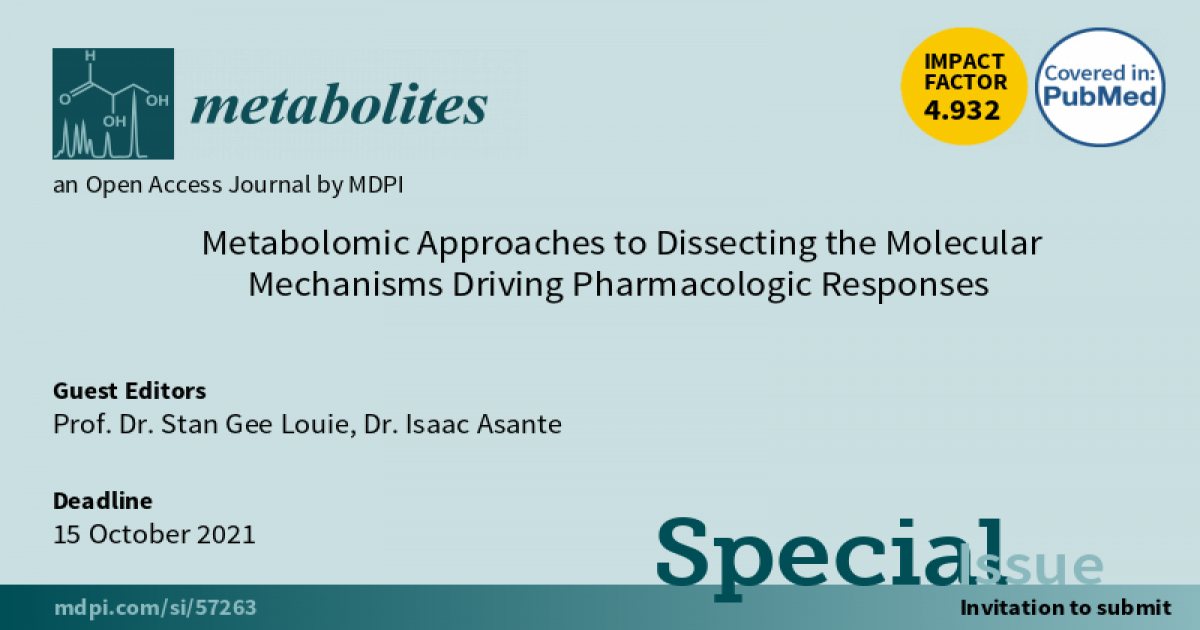Metabolomic Approaches to Dissecting the Molecular Mechanisms Driving Pharmacologic Responses
A special issue of Metabolites (ISSN 2218-1989). This special issue belongs to the section "Pharmacology and Drug Metabolism".
Deadline for manuscript submissions: closed (15 October 2021) | Viewed by 11433

Special Issue Editors
Interests: drug development along with the tissue reparative and inflammatory pathways found in the renin angiotensin/aldosterone system and bioactive lipid pathways
Special Issue Information
Dear Colleagues,
The sequencing of the human genome has ushered in the age of “omics”. The vast amount of information has accelerated our understanding as to how subtle changes in biology may determine wellness or disease. Metabolomics is able to phenotype the various changes in a system and thus allow investigators to not only profile the changes but also identify targets and strategies for therapeutics. Metabolomics is a highly precise tool that can also be used to verify the biological effects of the new chemical or biological entities.
This Special Issue of Metabolites will address the evolving technology and analysis of metabolomics and lipidomics investigation. We will highlight how metabolomics is evolving in disease monitoring and drug development. Our ability to comprehensively understand the impact of various treatments will give us confidence as to how a drug may work. In addition, it may also enable us to identify potential risks associated with the treatments. All of these will ensure the development of more effective therapies and the optimization of safety margins. We encourage colleagues to submit manuscripts dealing with how metabolite profiling can help us to interrogate molecular mechanisms in vitro, in vivo, and in the clinic. We also encourage colleagues to share their experiences with the use of metabolomics for monitoring drug effects in humans with the scientific community.
Prof. Dr. Stan Gee Louie
Dr. Isaac Asante
Guest Editors
Manuscript Submission Information
Manuscripts should be submitted online at www.mdpi.com by registering and logging in to this website. Once you are registered, click here to go to the submission form. Manuscripts can be submitted until the deadline. All submissions that pass pre-check are peer-reviewed. Accepted papers will be published continuously in the journal (as soon as accepted) and will be listed together on the special issue website. Research articles, review articles as well as short communications are invited. For planned papers, a title and short abstract (about 250 words) can be sent to the Editorial Office for assessment.
Submitted manuscripts should not have been published previously, nor be under consideration for publication elsewhere (except conference proceedings papers). All manuscripts are thoroughly refereed through a single-blind peer-review process. A guide for authors and other relevant information for submission of manuscripts is available on the Instructions for Authors page. Metabolites is an international peer-reviewed open access monthly journal published by MDPI.
Please visit the Instructions for Authors page before submitting a manuscript. The Article Processing Charge (APC) for publication in this open access journal is 2700 CHF (Swiss Francs). Submitted papers should be well formatted and use good English. Authors may use MDPI's English editing service prior to publication or during author revisions.
Keywords
- metabolomics in drug discovery
- precision medicine
- LCMS methods
- pharmacologic responses
- metabolite identification and quantification
- bioanalyses of metabolites
- machine learning
Benefits of Publishing in a Special Issue
- Ease of navigation: Grouping papers by topic helps scholars navigate broad scope journals more efficiently.
- Greater discoverability: Special Issues support the reach and impact of scientific research. Articles in Special Issues are more discoverable and cited more frequently.
- Expansion of research network: Special Issues facilitate connections among authors, fostering scientific collaborations.
- External promotion: Articles in Special Issues are often promoted through the journal's social media, increasing their visibility.
- Reprint: MDPI Books provides the opportunity to republish successful Special Issues in book format, both online and in print.
Further information on MDPI's Special Issue policies can be found here.






